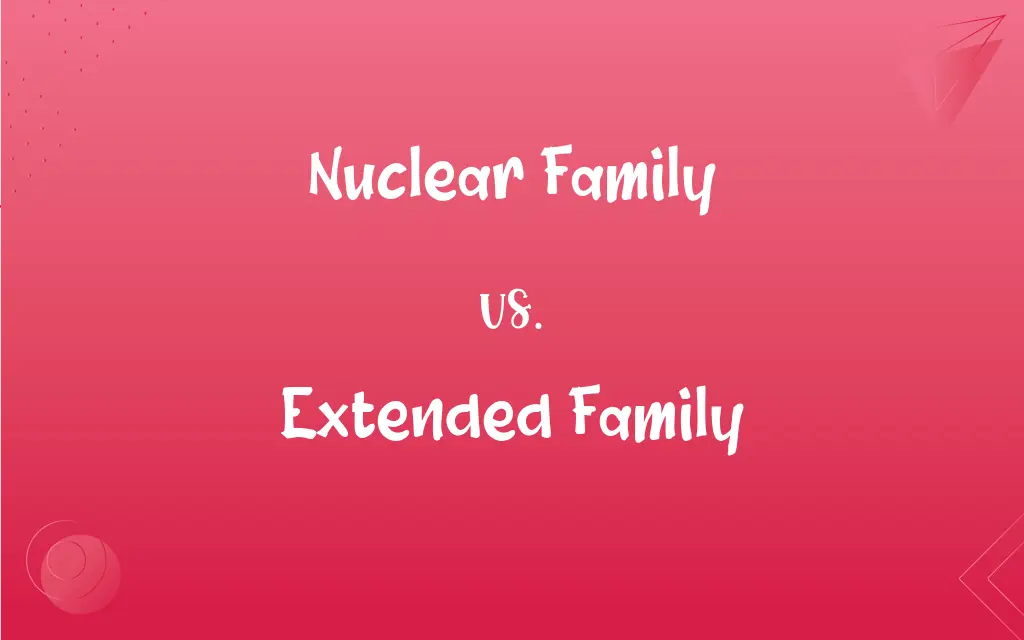Nuclear Family vs. Extended Family: What's the Difference?
Edited by Aimie Carlson || By Janet White || Published on January 25, 2024
Nuclear Family is a family unit consisting of parents and their children. Extended Family includes relatives beyond the nuclear family, like grandparents, aunts, uncles, and cousins.

Key Differences
A nuclear family is typically understood as a unit comprising parents and their children. This family structure is characterized by its immediate and direct relationships. In contrast, an extended family expands beyond this basic unit to include additional relatives such as grandparents, aunts, uncles, and cousins, fostering a broader familial network.
In a nuclear family, the focus is often on the direct upbringing and development of children within a limited familial circle. This compact structure can lead to stronger individual ties between parents and children. Conversely, an extended family provides a wider support system and a sense of belonging to a larger community, enriching familial interactions with diverse influences and experiences.
The dynamics within a nuclear family are typically more concentrated, with parental roles being distinctly defined. This can lead to more focused attention on children's needs and a cohesive family unit. The extended family, however, offers a more communal approach to child-rearing and daily life, with responsibilities and support shared among various members.
The nuclear family is often seen as more mobile and adaptable to modern societal changes due to its smaller size and simpler dynamics. In contrast, the extended family, with its complex relationships, can provide a stronger sense of cultural continuity and tradition, preserving familial customs and practices.
Privacy and independence are more readily achieved in a nuclear family setting, allowing for personal space and individual growth. The extended family, with its intricate web of relationships, often fosters a deeper sense of communal living and shared responsibilities, which can sometimes lead to less personal privacy but a stronger collective bond.
ADVERTISEMENT
Comparison Chart
Size
Smaller, parents and their children
Larger, includes relatives beyond the immediate family
Support System
More focused, primarily from parents
Broader, includes various relatives
Child-Rearing
Direct parental involvement
Involvement of extended relatives
Cultural Continuity
Less emphasis on extended familial traditions
Stronger preservation of traditions
Privacy and Independence
More due to smaller size
Less due to larger, interconnected family structure
ADVERTISEMENT
Nuclear Family and Extended Family Definitions
Nuclear Family
A central family group consisting of immediate members.
Their nuclear family gatherings were always intimate.
Extended Family
A broader family circle that encompasses relatives not in the immediate family unit.
The extended family played a crucial role in their upbringing.
Nuclear Family
A household made up directly of parents and their children.
Their nuclear family dynamics influenced their daily routines.
Extended Family
A family group that includes various generations and branches of relatives.
In their culture, the extended family lived together in one large house.
Nuclear Family
The smallest family unit in societal structure.
In urban areas, a nuclear family is often the norm.
Extended Family
A wide-ranging family circle beyond parents and children.
The holiday celebrations were a gathering of the extended family.
Nuclear Family
A family unit of parents and their children.
The nuclear family went on a weekend camping trip.
Extended Family
A familial network that includes secondary and tertiary relatives.
The wedding was a big affair, attended by the entire extended family.
Nuclear Family
A basic social unit in a community, typically a couple and their offspring.
The school organized events keeping the nuclear family in mind.
Extended Family
A family that extends beyond the nuclear family, including grandparents, aunts, uncles, and other relatives.
Their extended family reunions were always large and joyous.
FAQs
What are the advantages of a nuclear family?
A nuclear family often provides focused parenting and greater independence.
What constitutes a nuclear family?
A nuclear family consists of parents and their children living together.
Can living in a nuclear family foster stronger individual relationships?
Yes, the smaller size of a nuclear family can lead to stronger individual bonds.
How is an extended family different from a nuclear family?
An extended family includes relatives beyond the immediate parents and children, like grandparents, aunts, uncles.
Can a nuclear family be part of an extended family?
Yes, a nuclear family can be a subset of a larger extended family.
Is the nuclear family structure prevalent worldwide?
It's common in many societies, especially in Western cultures.
What benefits does an extended family offer?
Extended families offer a broad support system and maintain cultural traditions.
Do extended families play a role in child-rearing?
Yes, extended families often share responsibilities in raising children.
Do nuclear families have a significant impact on housing trends?
Yes, the prevalence of nuclear families influences the demand for smaller housing units.
How does an extended family influence cultural identity?
Extended families help in preserving and passing down cultural identities and traditions.
Can extended families help in emergencies better than nuclear families?
Yes, as they have more resources and people to provide assistance.
Is the concept of a nuclear family more modern?
Yes, the nuclear family concept aligns more with modern, urbanized lifestyles.
How does privacy differ in nuclear and extended families?
Nuclear families often offer more privacy, while extended families provide a communal living experience.
Does living in a nuclear family offer more financial flexibility?
Often, yes, due to fewer financial dependencies within the household.
Can an extended family include non-blood-related members?
Yes, it can include in-laws, step-relatives, and even close family friends.
Is the dynamic in a nuclear family simpler than in an extended family?
Yes, with fewer members, family dynamics are often more straightforward.
Are nuclear families typically more mobile?
Yes, due to their smaller size, nuclear families tend to be more mobile.
Is the support system in a nuclear family limited?
It's more focused but can be perceived as limited compared to the extensive support in extended families.
How does an extended family impact social interactions?
It provides a broader social network and diverse interactions.
How do celebrations differ between nuclear and extended families?
Celebrations in extended families tend to be larger and more inclusive.
About Author
Written by
Janet WhiteJanet White has been an esteemed writer and blogger for Difference Wiki. Holding a Master's degree in Science and Medical Journalism from the prestigious Boston University, she has consistently demonstrated her expertise and passion for her field. When she's not immersed in her work, Janet relishes her time exercising, delving into a good book, and cherishing moments with friends and family.
Edited by
Aimie CarlsonAimie Carlson, holding a master's degree in English literature, is a fervent English language enthusiast. She lends her writing talents to Difference Wiki, a prominent website that specializes in comparisons, offering readers insightful analyses that both captivate and inform.































































